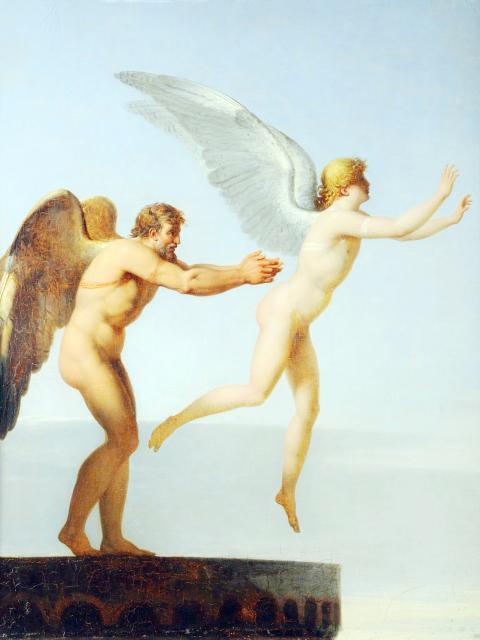Chinese Practice
暴虎馮河
(bao4 hu3 ping2 he2)

Photo: Wikimedia Commons
照片:維基共享資源
tackling tigers unarmed; wading rivers unaided
希臘神話中的代達洛斯發明了一種迷宮,用來在克里特島上關押牛頭怪,有個故事便是描述代達洛斯逃離克里特島的經過。由於得罪了米諾斯國王,代達洛斯和他的兒子伊卡洛斯一起被囚禁在迷宮裡。代達洛斯知道若他們由海路逃出就會被逮到,因此就用蠟黏合羽毛做成飛行的翅膀,並囑咐伊卡洛斯要緊緊跟著他。代達洛斯警告兒子不要飛得太靠近水面——因為這樣會弄濕羽毛、飛不起來,也不要太靠近太陽——因為太陽會融化黏合羽毛的蠟。年輕的伊卡洛斯浮躁魯莽、血氣方剛,對他父親的警告置之不理,飛得太靠近太陽,結果他的翅膀就熔化散落,他便跌進海裡淹死了。
這個故事便是「don’t fly too close to the sun」(別飛得太靠近太陽)一語之由來,這是在警告不智與魯莽的行為,因為這樣會讓自己身陷險境。
中文成語「暴虎馮河」的出處相當古老,可追溯到秦帝國之前。「馮河」(「馮」音「憑」)一詞出現在古中國占卜經典《易經》,而「暴虎」(「暴」音「爆」)和「馮河」二詞皆可見於《詩經》(「暴虎」還出現了兩次)。成語「暴虎馮河」結合了兩者,首見於儒家經典《論語》。
「暴」字意味著不使用武器戰鬥,因而「暴虎」則意指徒手打老虎——這當然是勇敢的,雖然不足可取。「馮」字意為涉水而行,「馮河」則指不藉助船隻過河。結合起來,成語「暴虎馮河」便指的是有勇無謀。
因此,《詩經.小雅.小旻》中寫道:
「不敢暴虎,不敢馮河。
人知其一,莫知其他。
戰戰兢兢,如臨深淵,如履薄冰。 」
而《詩經.鄭風.大叔于田》,則寫道:
「大叔于田,乘乘馬,執轡如組,兩驂如舞。
叔在藪,火烈具舉。
襢裼暴虎,獻于公所。
將叔無狃,戒其傷女。」
因此《詩經》所建議的,是採取謹慎的態度。孔子也不贊同暴虎馮河這種不智的魯莽行為:他更傾向要其弟子採取一種更深思熟慮的保守態度——《論語.述而》中便寫道,「子曰:『暴虎馮河,死而無悔者,吾不與也。必也臨事而懼,好謀而成者也。』」(孔子說:「那些徒手打老虎,或不藉助船隻過河,就算因此而死也不後悔的人,我不會與他們為伍。我的同伴必須是懂得戒慎,想出最妥善因應辦法的人。」(台北時報林俐凱譯)
領導人一被激怒,就宣布開戰,而沒有考慮通盤計畫,這種暴虎馮河的行為,只是逞匹夫之勇。
(If leaders are too quick, when incensed, to declare war with little thought for the consequences, they demonstrate the reckless bravado of a fool.)
他那種暴虎馮河的蠻幹作風,只是去冒無謂的險,到時候賠上了性命,就得不償失。
(His rash ways will only see him getting in danger for no good reason, and in the end he will pay with his own life, and for what?)
英文練習
don’t fly too close to the sun
A Greek myth tells of how Daedalus, the inventor of the labyrinth that contained the Minotaur, tries to escape the island of Crete. He had been imprisoned, together with his son, Icarus, in the labyrinth, for offending King Minos. Knowing that they would be caught if they attempted to escape by sea, Daedalus makes wings of feathers bound by wax, and warns Icarus to follow him closely. He cautions him not to fly too close to the water — which would dampen the feathers and weigh down the wings — or too close to the sun, which would melt the wax binding the feathers. The young Icarus — impetuous, reckless and excitable — ignores his father’s warning and flies too close to the sun. His wings fall apart and he plunges to the sea below and drowns.
From this, we get the idiom "don’t fly too close to the sun," a caution against unwise, rash behavior that could put one in danger.
The Chinese idiom 暴虎馮河 is of considerable antiquity, dating to pre-imperial China. The phrase 馮河 is found in the ancient Chinese divination classic yi jing (Book of Changes), while 暴虎 and 馮河 appear (twice, in the case of 暴虎) in the shijing (Book of Poetry). The combined idiom 暴虎馮河 is in the Confucian lunyu (Analects).
The character bao 暴 means “to fight without weapons”: 暴虎, then, means to fight a tiger barehanded, something that is certainly brave, although not altogether advisable. The character ping 馮 means to wade, pinghe 馮河 to cross a river unaided by a boat. Together, the idiom refers to reckless displays of bravery.
Thus, the xiaoya hymn xiaomin in the Book of Poetry includes the verse:
“They dare not without weapons attack a tiger; they dare not without a boat cross the He river.
They know one thing, but they only know that one.
We should be apprehensive and careful,
As if we were on the brink of a deep gulf, as if we were treading on thin ice.”
And in the guofeng (airs of the states) folk song da shu yu tian in the zheng feng (Odes of Zheng) section of the Book of Poetry we find:
“Shu has gone hunting, mounted in his chariot and four.
The reins are in his grasp like ribbons, while the two outside horses move as dancers do.
Shu is at the marshy ground; the fire flames out all at once,
And with bared arms he seizes a tiger, and presents it before the duke.
O Shu, try not [such sport] again; beware of getting hurt.”
The Book of Poetry, then, advises a cautious approach. The ancient Chinese sage Confucius, for his part, was none too impressed with such displays of injudicious recklessness: he preferred a more considered, conservative approach in his disciples. In the shu er chapter of the Analects, it is written 子曰:「暴虎馮河,死而無悔者,吾不與也。必也臨事而懼,好謀而成者也。」(The Master said, "He who will unarmed attack a tiger, or cross a river without a boat, dying without any regret, I would not have act with me. My associate must be the man who proceeds to action full of solicitude, who is fond of adjusting his plans, and then carries them into execution"). (Paul Cooper, Taipei Times)
You know Bob is irritable. Don’t keep provoking him. Beware of flying too close to the sun.
(你知道巴布很容易生氣,你不要一直去刺激他,小心你會擦槍走火。)
I think we need to be more rigorous with our finances. If we keep spending at this rate we will be flying a bit too close to the sun for my liking.
(我覺得我們應該要把錢管嚴一點。如果我們繼續像這樣子花錢,恐怕會給自己惹上麻煩。)

China commemorated 80 years since the end of World War II last week with a massive military parade against a backdrop of a disputed history about who ultimately defeated Japan. The issues, including Japan’s reckoning with its wartime record in China, are bound to flare again in December, a flashpoint anniversary of the mass killing in Nanjing by invading Japanese troops. Below is an explainer about what the different — and disputed — points of view are. WHAT IS CHINA’S VIEW? For the Chinese government sitting in Beijing, this is a clear-cut issue: China sacrificed 35 million people in a heroic and brutal struggle

Rarely does Nature present such a striking contradiction as the one found in Lencois Maranhenses National Park. Located along Brazil’s northeastern coast, the park unveils breathtaking scenery, where rippling sands meet crystal-clear lagoons. Under the sun’s golden glow, the waters glitter in shades of turquoise and emerald. So surreal is this spectacle that visitors might wonder if they’re gazing at a digitally modified photo rather than a living landscape. Were it not for the unique geographical and climatic conditions, such a marvel would not exist. Unlike typical deserts, Lencois Maranhenses receives a substantial amount of rainfall, particularly during the rainy season

In a major step to combat carbon emissions, Norway’s pioneering “Northern Lights project” is set to expand its carbon capture and storage (CCS) capabilities. Backed by energy giants and the Norwegian government, this collaborative project is working to increase its annual carbon storage capacity from 1.5 million to over five million tons. Northern Lights focuses on capturing CO2 emissions from industrial sources across Europe and securely storing them underground. Captured CO2 will be liquefied and transported by ship to the storage facility located off the coast of Norway. It will be injected through pipes into geological formations about 2,600m below the

1. 我和他相識已經九個月了。 ˇ He and I have known each other for nine months. χ I and he have known each other for nine months. 註:單數的不同人稱代名詞連用,其次序一般是 you and I、you and he、he and I、she and I。複數人稱代名詞的次序是 we and you、you and they、we, you, and they。 2. 我自己不願意去那家公司工作。 ˇ I myself am unwilling to work in that company. χ Myself am unwilling to work in that company. 註:myself、yourself、himself、herself、itself、ourselves、yourselves、themselves、oneself 等反身代名詞可用來加強語氣,但必須跟在其所加強的人之後,不能單獨出現當作代名詞用。 I myself went there. I’ll do it myself. He did it himself. 3. 沒有人知道這件事情。 ˇ Nobody knows about this. χ No body knows about this. 註:nobody 不可寫作 no body;同樣 anybody、somebody、everybody 都不可以分開來寫。說「沒有人」,用 no one 或 none 都可以。 4. 我會把自己的書送給他。 ˇ I will give my own book to him. χ I